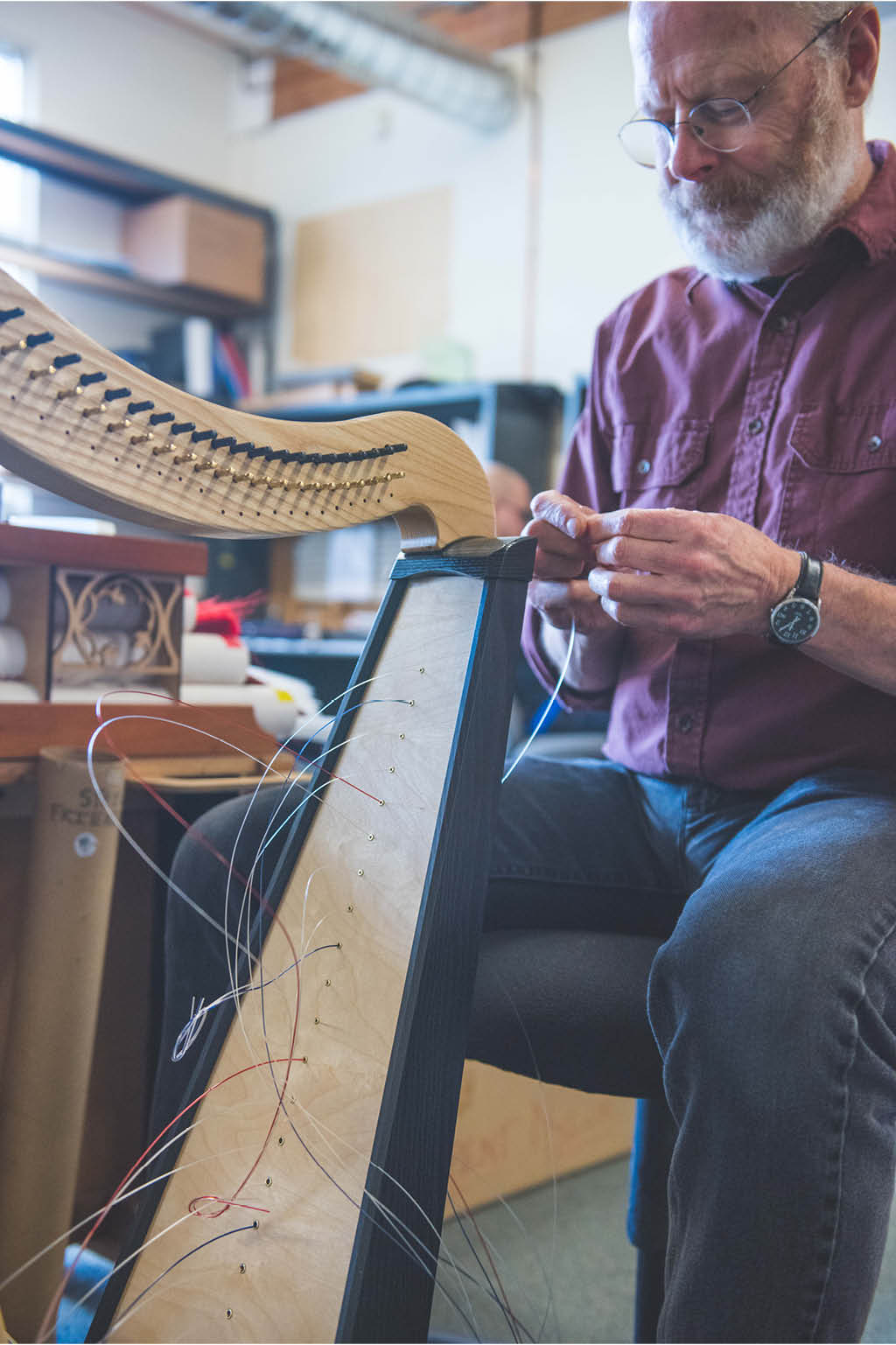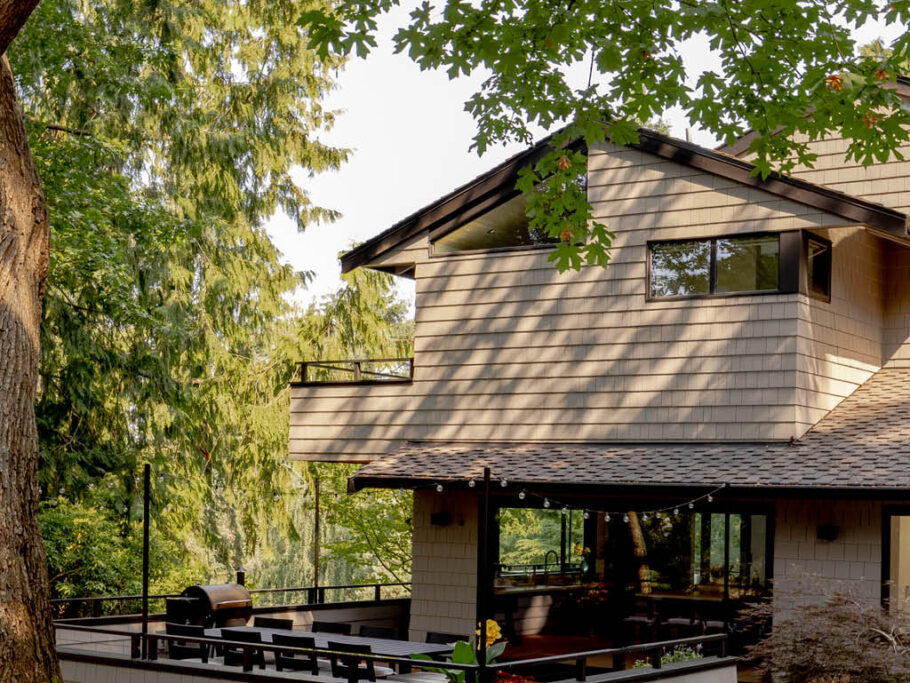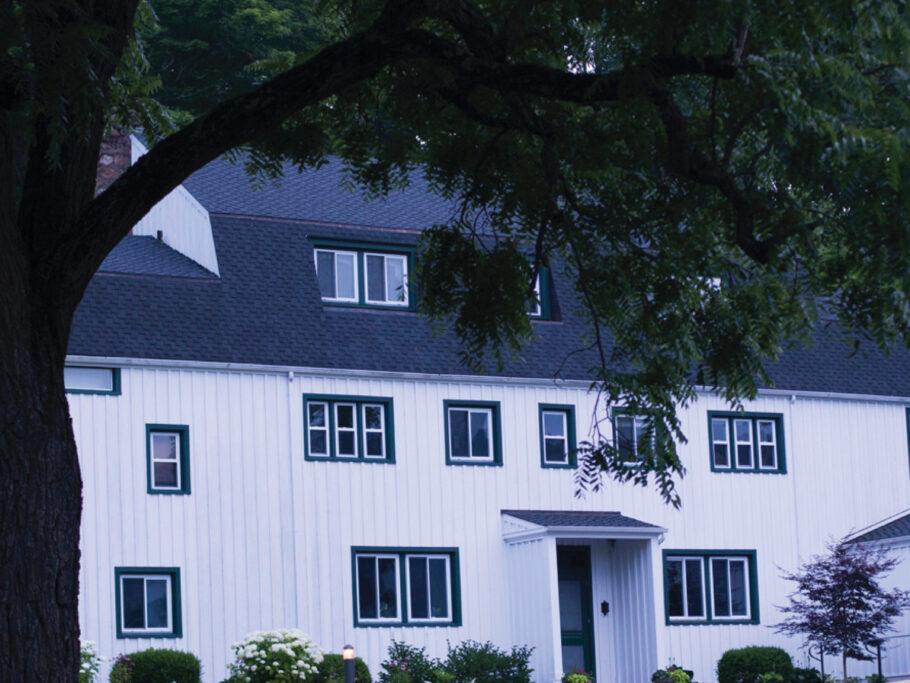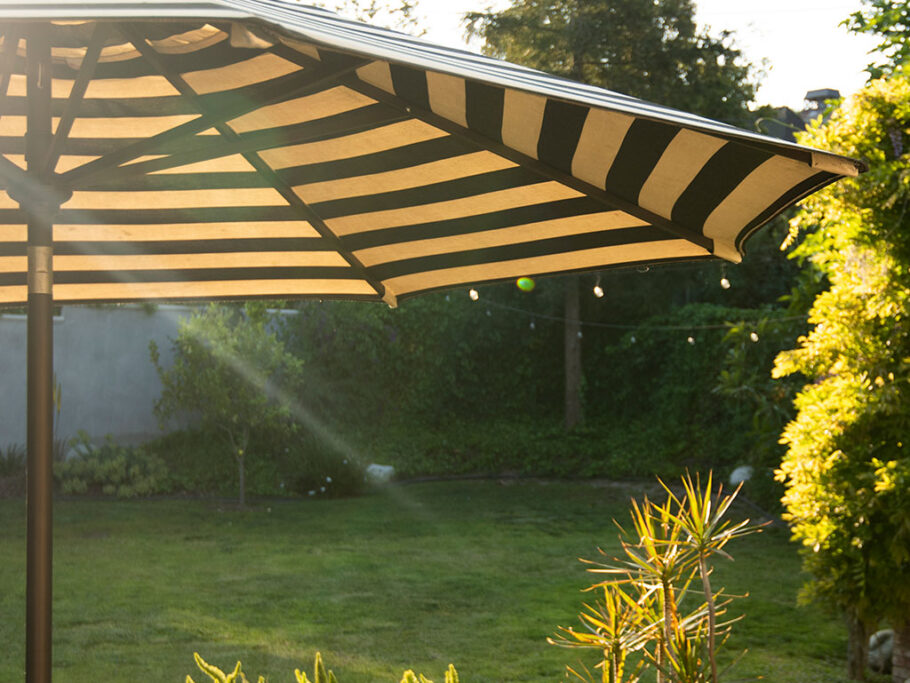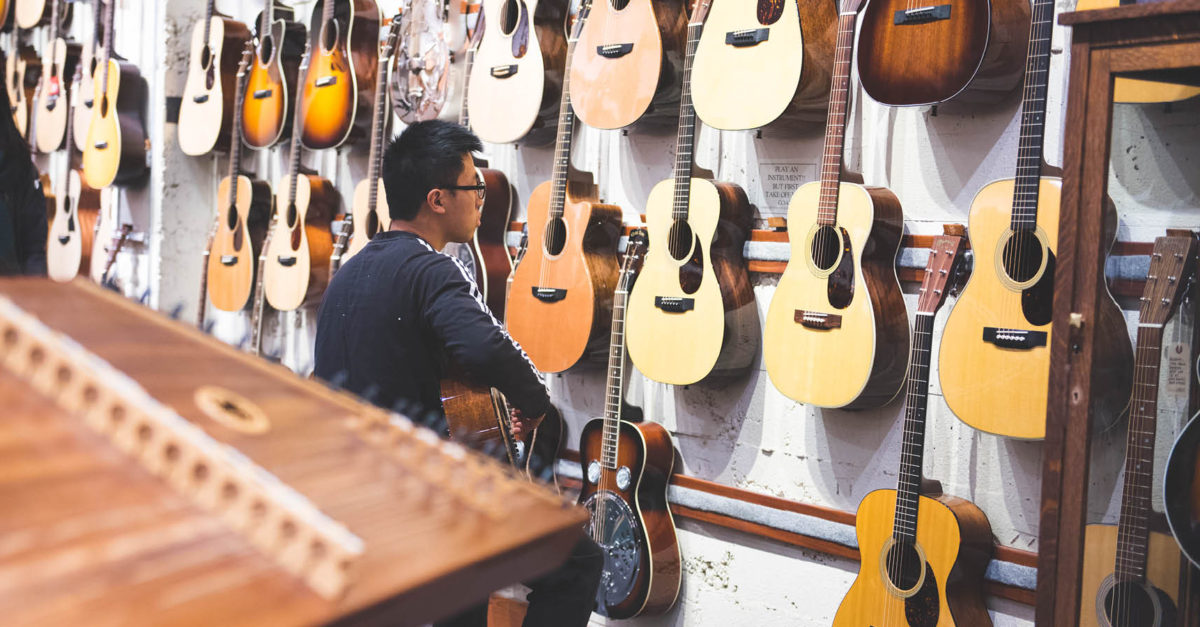The Heart of Music in the Heart of Fremont
Jonathan Shue is on a quest for authenticity. And he’s coming after your voice—your singing voice, that is. In his position as director of the music school and as a vocal coach at Dusty Strings in Seattle, Washington, Shue views his job as a chance to unlock the potential musical expression inside each of his students. Convinced that singing is as natural as breathing, he encourages students to get out of their own way and discover what he calls their “authentic voice.”
One such vocal class is titled “Explore Your Voice,” which surprisingly begins with a drawing exercise. Students are presented with crayons and blank paper and are prompted to draw what they imagine their voice to look like visually. Spheres, lines,and rainbows have all appeared on these pieces of paper. Shue then collects these drawings and redistributes them four weeks later at the conclusion of the class, when the students are again asked to draw how they view their voice now. The initial perceptions are always more controlled, constrictive, and focused on details in contrast to the fanciful, imaginative, and freer drawings they produce at the end of the series. Shue attributes this shift to learned societal rules that condition us to use our voice in certain ways. Shue hypothesizes, “Newborn babies are seven or eight pounds, and they can make noise. As adults who weigh more than twenty times that, we often find ourselves unable to make such noise. Babies’ vocal channels are wide open and uninhibited because they are coming from a primal place.”
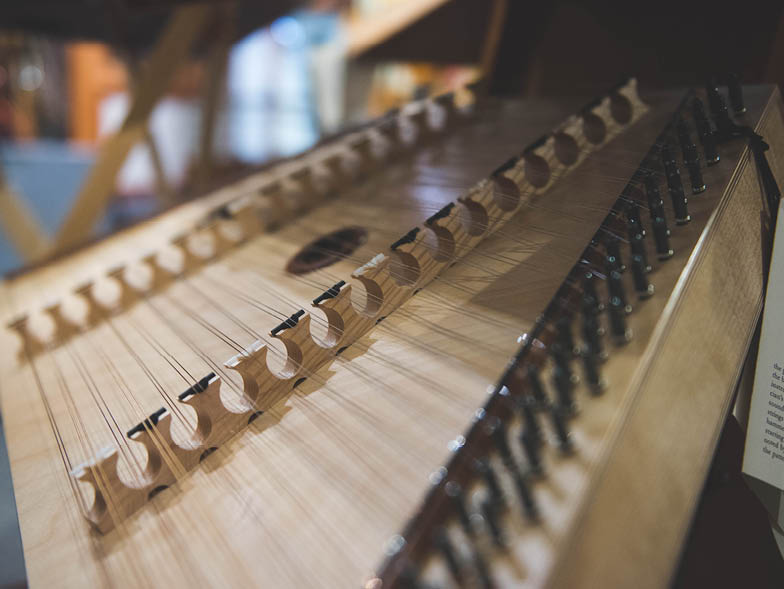
Shue’s holistic and insightful approach to music and teaching is part of what makes him such an ideal fit for his current gig at the renowned Dusty Strings in the artsy Fremont neighborhood, where neighbors include a vegan bakery and coffee house, a record store where you can find Judy Garland on vinyl in the clearance bins, and a no-frills pho shop. Shue had finished graduate school at the University of Washington and was looking for work. He’d known about Dusty Strings for a couple of years and was hired to work on the retail floor. Within a couple weeks, the position of music school director opened up, and Shue had all the credentials to be a perfect fit. It was kismet, as he says.
Dusty Strings was started in the basement of Ray and Sue Mooers in 1978; Ray built hammered dulcimers and sold them at festivals and craft fairs. They moved to their current location in Fremont in 1982, producing and manufacturing harps and dulcimers. In the early 1990s, they expanded to sell fretted instruments. By 2002, they had outgrown the space and moved the instrument-building portion of the business to a larger space in the Interbay neighborhood of Seattle. It was an ideal time to consider branching out and connecting with customers in a new way, as music retailers around the country were starting lesson programs and workshops. The space was eventually renovated, creating three classrooms and five private lesson rooms, and the music school was born in 2008.
Shue is now in charge of forty teachers, all highly accomplished working musicians, who give lessons primarily focused on acoustic fretted instruments, as well as voice and the violin. He works closely with them to plan classes throughout the year, ensures they are getting lesson referrals, and coordinates spaces in which to teach. A self-described go-getter with a penchant for taking on new projects, Shue has dedicated time to streamlining and organizing classes to enhance the student experience. He explains, “There were several guitar classes, but they all had different titles and focuses. I worked closely with the teachers to rebrand the classes. Now it’s clear to the customer that this is beginning, intermediate, and so on. We offer three beginner-level classes, three intermediate-level classes, specialty classes, and master classes. There is something for everybody.”
This concept of “something for everybody” is a cornerstone of Dusty Strings’s (and Shue’s) mission statement. Their number one goal is to bring music into people’s lives. And they cater to all levels of musicians with varying degrees of free time to dedicate to their musical craft. Shue is refreshingly sympathetic to his students who don’t have time to practice outside of Dusty Strings, while acknowledging it’s his responsibility as an educator to push and challenge his students. Above all else, Shue desires to cultivate a lifelong love and pursuit of music. And his vision is echoed by the entire Dusty Strings community, from the teachers to the retail floor and all the way up to the top. Ray and Sue Mooers have set the tone for a work culture that balances running a successful small business that has garnered international acclaim with keeping a strong sense of community and family. Many of the employees of the shop are gigging musicians, and everyone pitches in to cover shifts when necessary.
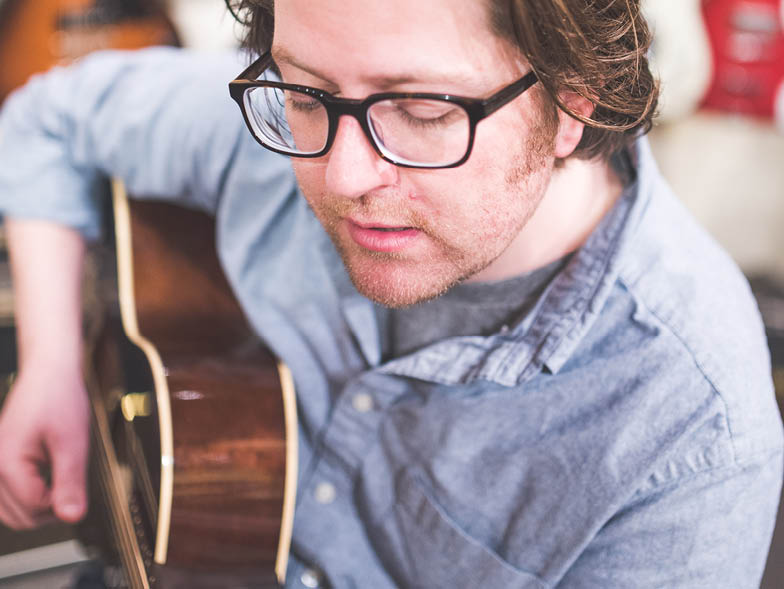
Shue himself is a professional musician, as well as being heavily involved in the theater world. He is involved in all aspects of theater production, including directing, acting, composing music, and music directing. As a child, he and his dad played together, dubbing themselves the Shue Boys and recording their musical ventures onto cassette tapes. Shue reminisces, “We would take a cassette of a live band, cut out the audience applause part of it, and tack it on the end of our songs. That was my home life.” His passion coming into middle school and high school was theater and drama, and he thought he had to give up being a musician to pursue his love of the theater. Now he sees it as one thing, and his role as director of the music school is a perfect confluence of these life pursuits. Shue references Neil Young, who said, “It’s all one song.”
Shue is constantly on the lookout for new ways to engage the community and attract possible students. One of these endeavors is called Gather and Sing, a free hour- long singalong on Wednesday afternoons featuring Shue on his guitar and binders full of lyrics. He’s currently focused on spirituals and gospels, but his repertoire is constantly changing. Predictably, Shue’s influences are artists who embody authenticity—talents like Neil Young, Bob Dylan, Tom Waits, Leonard Cohen, Joni Mitchell, and Woody Guthrie. Of his idols, Shue says, “Neil Young has been my favorite since I’ve been little. He’s unabashedly himself, to the point that he’s not afraid to contradict himself—the mark of a great artist. Nina Simone and Amy Winehouse are two female singers I’ve been so inspired by. They were digging and searching, all in the pursuit of some idea of truth.”
As much as he admires the seasoned veterans of song, Shue has a soft spot in his heart for amateurs. He continues, “I’m a big fan of the word amateur. It comes from a Latin word that means ‘from the heart.’ Amateur has a stigma, but there are times I wish I were an amateur because it’s in that uncomfortable zone that you really are learning and coming alive.” Shue believes there is a magical quality to acoustic instruments in particular, and in the way the wood resonates. This vibration connects with people and connects them to their own history, culture, ancestry, family, and life experience. When you go back and look at history, folk music (or “porch music,” as Shue refers to it) was one of the predominant ways people entertained themselves and connected with each other. Everyone knew a tune. There is still a basic human desire to connect through song and through music, and to allow the authenticity of your own voice to seek out the authenticity of another. And Jonathan Shue is waiting to welcome you in.
For more info, visit dustystrings.com.
